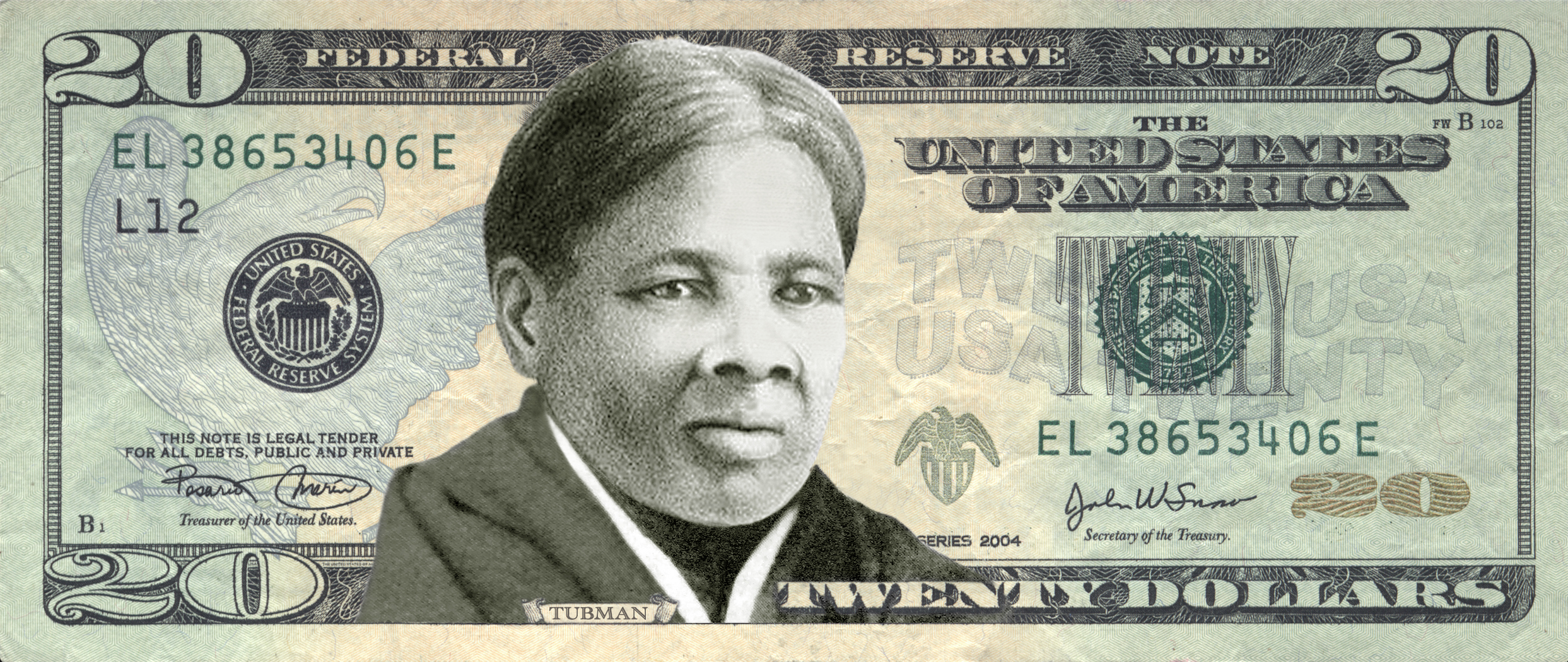Harriet Tubman on the $20: Token gesture, or a good start?

When she served as a Union spy during the Civil War or returned time after time to lead enslaved people to freedom over trails she herself had blazed, Harriet Tubman operated in stealth. Today she is the center of attention and debate. That’s what happens when an African American icon is chosen to replace a president on the $20 bill in a country that is still struggling to resolve issues of race, gender, and privilege.
That president, Andrew Jackson, our nation’s seventh, was a slave holder whose presidential policies and personal beliefs sent Cherokees on the Trail of Tears. While the tradition of his face on the $20 has its defenders, his actions have little support today. Efforts to replace him, in a campaign by the nonprofit Women On 20s—with the slogan “a woman’s place is on the money”—came down to a “final four” of sorts. (Susan B. Anthony and Sacajawea have already earned the honor, but not on currency that’s as much a part of daily commerce as the $20.)
In public voting, Tubman bested Eleanor Roosevelt, whose activism redefined the role of first lady; Rosa Parks, whose real and symbolic action of sitting in the front of the bus has in a way overshadowed her civil and human rights work before and after that moment; and Wilma Mankiller, principal chief of the Cherokee Nation and first elected female Chief of a Native nation in modern times.
Imagining what Jackson would make of that list is enough to make the campaign worth it.
First reactions to the announcement of Tubman’s achievement were of the “about time” variety, though it was disappointing to hear some supposedly educated people wonder who this woman Harriet Tubman was. (Seems like we still need a Black History Month/Woman’s History Month/etc. corrective to what’s missing from the textbooks, after all.)
More surprising, perhaps, was the mixed initial response from African Americans. Perhaps that reaction should not have been that unexpected in a time when the progress and promise of Tubman’s bravery, dangerous work, and persistent resolve has stalled in Baltimore, New York, Cleveland, and cities and towns across the country.
The arguments were summed up by columnists and commentators. On one side, Kirsten West Savali wrote on The Root: “Haven’t we been commodified and trafficked enough? Slapping a black female face, one of our radical icons, on a $20 bill as if it’s some attainment of the American dream would be adding insult to injury.” On the other side, David Swerdlick said in The Washington Post: “Regardless of race, when your contributions to this country’s history are as consequential as Tubman’s … this is how you’re commemorated, or, at least, should be.”
Both raise valid and sensible points. Gazing at the resolute image of Tubman each time you visit the cash machine won’t change statistics. Tubman was an advocate for women’s suffrage, but to memorialize her on currency as a stand-in for all women doesn’t erase the pay gap—not only between men and women but between white women and black women.
A Black Women’s Roundtable report found that despite their achievements in education and business, African American women still have less favorable health-care options and outcomes and are more likely to be victims of violence than white women. Black girls are suspended at higher rates than girls of any other race or ethnicity and most boys, the Department of Education found. Activists have lobbied the White House for the inclusion of girls and young women in the My Brother’s Keeper initiative.
If Harriet Tubman were alive, she probably would be standing with those activists, since she was a warrior who repeatedly put her own life in danger for the liberation of others. She certainly would be comforting the mourning mothers of the men and women who have lost lives in encounters on neighborhood streets in confrontations with peers or with those tasked with protecting communities.
Seeing her name and picture on money probably would not rate a second glance from Tubman herself, as she judged the work still to be done and went about it.
This one honor won’t solve all American society’s ills, and it may even be seen as crass—using money to reward a woman who fought against being treated as the spoils of a transaction. But that’s a lot of weight to put on this one honor, way too much for it to bear.
Are there positives? There is the satisfaction of knowing there will be an instant, though momentary reminder of Tubman’s place in American history each time an ATM spews a $20. That is a rather cool, even subversive notion, since those who object to the choice will have to bear it or boycott the bill.
And to young women, especially young African American women, who are still striving against the odds, Tubman is an example of grace, grit, and spirit in one body. The woman born a slave survived so much, overcame crushing odds, and achieved far beyond what America expected or deserved.
She is a ray of hope, and her face on the $20 would fill in one more space missing in all those history books of the contributions of Americans of every color and gender whose blood, sweat, hard work, and sacrifice are part of this all-American soil.
It’s a start.
_______________________________________________________
WMC's 2015 Progressive Women's Voices Media Training Program is accepting applications until June 8, 2015. Apply NOW!.
More articles by Category: Economy
More articles by Tag: Identity




























